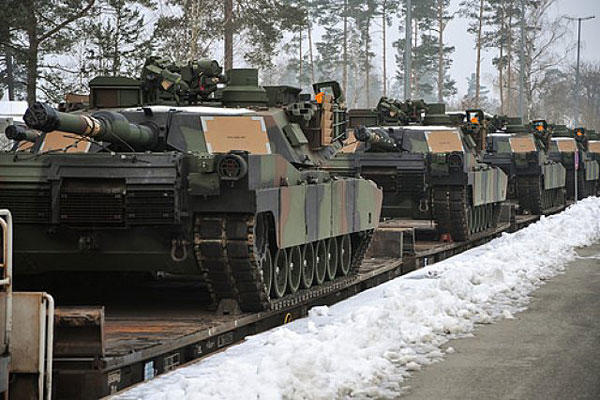The new chairman of the House Armed Services Committee defended a host of controversial decisions made by Congress that went against the Pentagon's recommendation – namely paying to upgrade Abrams tanks, keep the A-10 alive, and stifle stiffer pay and benefits decreases.
Rep. William McClellan "Mac" Thornberry, R-Texas, set out an agenda Tuesday that signaled another year of budget conflict with the White House and Pentagon on issues ranging from pay and benefits to retention of the A-10 and upgrades for Army tanks.
"Some people expect lawmakers to just cut the check and not ask too many questions," Thornberry, R-Texas said at the American Enterprise Institute. "But Congress should not give any president a blank check, nor should Congress be a rubber stamp."
Thornberry, who succeeded the retiring Rep. Howard "Buck" McKeon as HASC chairman, pointed to the decision by HASC last year to include $120 million in the National Defense Authorization Act for upgrades to M1A1 Abrams tanks, despite the Army's long-standing contention that it already had more tanks than it needed.
"We made a judgment call" to keep the tank production line open at the General Dynamics plant in Lima, Ohio, Thornberry said. "Just last month, the U.S. Army sent 100 M1 Abrams tanks back to Europe in response to the Ukraine crisis. That might be some evidence that Congress made the right call."
Thornberry also signaled that HASC would again oppose White House and Pentagon proposals to retire the A-10 Thunderbolt ground attack aircraft and the U-2 spy plane, close excess military bases, and undertake major reforms of pay, benefits and health care.
The Pentagon and Congress faced difficult choices on which weapons systems to mothball, Thornberry said, but "we don't know that we want to give up the A-10" in the process.
As for closing bases under a new Base Re-Alignment and Closure Commission (BRAC), Thornberry warned that "if we give up a base or a training range, it's gone forever." He also said that promised savings under the last round of BRAC had yet to be realized.
In response to a question, Thornberry said he was awaiting the Feb. 1 report of an independent commission on pay and benefits before deciding on whether to support reforms. Thornberry said his main concern on pay and benefits was "how it affects our ability to recruit and retain."
On the cost-cutting sequestration process, Thornberry offered little hope for reaching a compromise with the White House on easing the impact of the cuts that are slated to resume in Fiscal Year 2016.
"We've got to stop the slide in defense budgets. My primary point is it has to be fixed," Thornberry said on sequestration. "I don't know that anybody has a magic formula to do that."
Thornberry acknowledged that Congress can make the "wrong calls" and succumb to "parochial interests" to protect the businesses and bases in their districts rather than the overall goal of providing for the national defense.
"But please, don't fall into, as was said in another context, the soft bigotry of low expectations" from Congress, Thornberry said.
He spoke hours before President Obama was to deliver his "State of the Union" address. Last week, Air Force Secretary Deborah James and Air Force Chief of Staff Gen. Mark Welsh argued for lifting sequestration and said that Obama was expected to include ending sequestration as part of his budget proposals to be submitted next month.
The sequestration process authorized by the Budget Control Act of 2011 called for more than $1 trillion in cuts – divided between domestic and defense spending. Republicans and Democrats blame each other for failing to reach a compromise to ease the impact. The impact in Fiscal Year 2015 was eased by the National Defense Authorization Act, but the cuts are scheduled to resume in FY 2016.
Thornberry was more optimistic on the possibilities for reforming and speeding up the Pentagon's acquisition and procurement process for new weapons system following the nomination of former Deputy Defense Secretary Ashton Carter to succeed Chuck Hagel as defense secretary.
Currently, "this system is so gummed up it's a wonder anything ever comes out the other end," Thornberry said of acquisitions. "The world is moving too fast to be satisfied with the pace of acquisitions."
Thornberry said he already has spoken several times with Sen. John McCain, R-Arizona, the new chairman of the Senate Armed Services Committee (SASC), on reforming acquisitions.
McCain was in the process of setting out his own agenda that would be equally as confrontational with the White House and the Pentagon when it comes to retiring the A-10 and Obama's plan to close the Guantanamo Bay detention facility in Cuba before he leaves office.
McCain's first hearing as the new SASC chairman was scheduled for Wednesday with testimony from retired Air Force Lt. Gen. Brent Scowcroft, the former National Security adviser to Presidents Gerald Ford and George H.W. Bush, and Zbigniew Brzezinski, the former National Security adviser to President Jimmy Carter.
-- Richard Sisk can be reached at richard.sisk@military.com




























